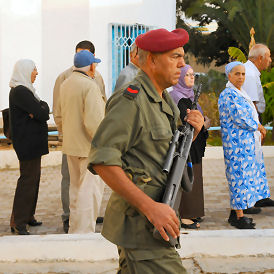First Arab Spring election in Tunisia
Tunisian voters are pouring into polling stations as the country holds its first free elections since the Arab Spring uprising.

The poll comes ten months after vegetable seller Mohamed Bouazizi set himself on fire, sparking mass protests against the rule of President Zine al-Abidine Ben Ali.
The demonstration ousted Ben Ali and revolts spread to Egypt, Libya, Yemen and Syria.
Tunisia is the first country to hold democratic elections, and the moderate Islamist Ennahda party is expected to net the biggest share of the vote.
After casting his vote, party leader Rachid Ghannouchi said: “This is an historic day. Tunisia was born today. The Arab Spring was born today.”
But as he emerged from the polling station, about a dozen people shouted at him: “Degage” French for “Go away” and “You are a terrorist and an assassin! Go back to London!”
Ghannouchi, who spent 22 years in exile in Britain, has said he will not try to impose Islamic values on society.
Ennahda is fielding several women candidates, including one who does not wear the hijab, and has promised not to undermine women’s freedoms.
But fundamentalist Salafist Islamists have attacked a cinema and a TV station in recent months over artistic material deemed blasphemous.
Ennahda says they have nothing to do with them, but liberals worried about the erosion of Tunisia’s secular, modernist traditions do not believe them.
This is the first time I have voted. Karima Ben Salem
Across Tunisia, queues stretching hundreds of metres formed outside polling stations from early in the morning.
This level of voter interest was never seen during Ben Ali’s rule, when only a trickle of people turned out for elections because they knew the result was fixed.
In the capital Tunis, Karima Ben Salem, 45, said: “This is the first time I have voted.
“I’ve asked the boys to make their own lunch. I don’t care … Today I am not on duty. Or rather, I am on duty for my country.”
Sunday’s vote is for an assembly that will draft a new constitution to replace the one Ben Ali manipulated to entrench his power.
It will also appoint an interim government and set elections for a new president and parliament.
Most forecasts are that Ennahda will not have enough seats for a majority in the assembly, forcing it to seek a coalition which will dilute the Islamist influence.
The Progressive Democratic Party (PDP), which is leading the challenge to Ennahda dominance, has campaigned on a platform of protecting Tunisia’s secular values.
-
Latest news
-
Windrush scandal: returning to the UK after a forty year wait6m

-
Netanyahu ‘survival’ depends on ‘expanding war’ says head of Palestinian National Initiative5m

-
Proposed law change could strip parental rights from paedophiles5m

-
Hugh Grant settles privacy lawsuit against The Sun newspaper publisher2m

-
Post Office Scandal: what did top executive know?6m

-




